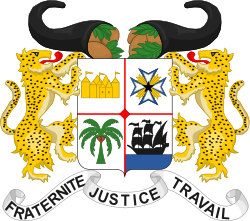 |
|---|
| |
Elections to the Territorial Assembly were held in French Dahomey on 31 March 1957. The result was a victory for the Republican Party of Dahomey, which won 35 of the 60 seats. [1]
 |
|---|
| |
Elections to the Territorial Assembly were held in French Dahomey on 31 March 1957. The result was a victory for the Republican Party of Dahomey, which won 35 of the 60 seats. [1]
 | |||||
|---|---|---|---|---|---|
| Party | Votes | % | Seats | +/– | |
| Republican Party of Dahomey | 109,927 | 38.57 | 35 | +16 | |
| Dahomeyan Democratic Union | 72,097 | 25.29 | 7 | +3 | |
| Dahomeyan Democratic Movement | 61,192 | 21.47 | 6 | –3 | |
| Other parties | 7,207 | 2.53 | 0 | – | |
| Independents | 34,606 | 12.14 | 12 | – | |
| Total | 285,029 | 100.00 | 60 | +10 | |
| Valid votes | 285,029 | 97.63 | |||
| Invalid/blank votes | 6,909 | 2.37 | |||
| Total votes | 291,938 | 100.00 | |||
| Registered voters/turnout | 673,056 | 43.37 | |||
| Source: Sternberger et al. [2] | |||||
Figures for independent candidates include the Independents of the North.
The Territorial Assembly office was composed as follows:
| President | Sourou-Migan Apithy |
| Vice-presidents | Hubert Maga, Francis Covi, Jean Agier and Michel Noudehou |
| Secretaries | Nicolas Amoussou Eouagnignon, Antoine Mensah, Chabi Mama and Jean-Baptiste Kayossi |
| Questeurs | Amzat Sani Agata and Atégui Batcho |
| Source: Oudard. [3] | |